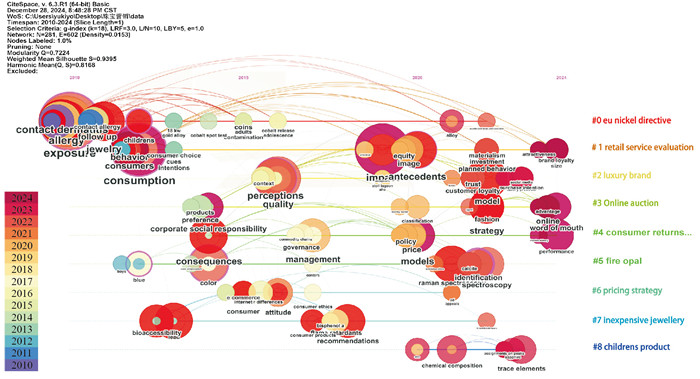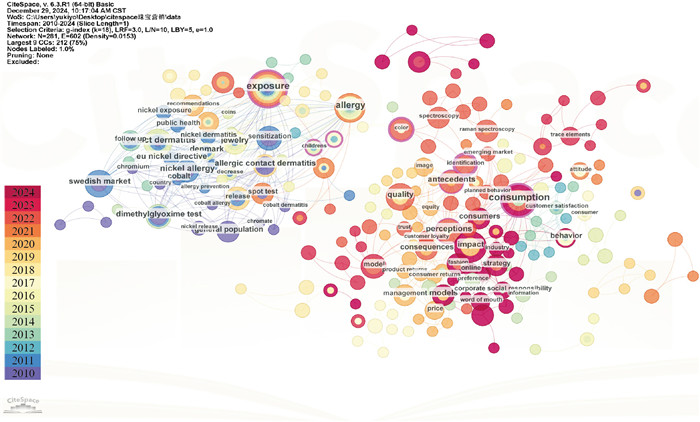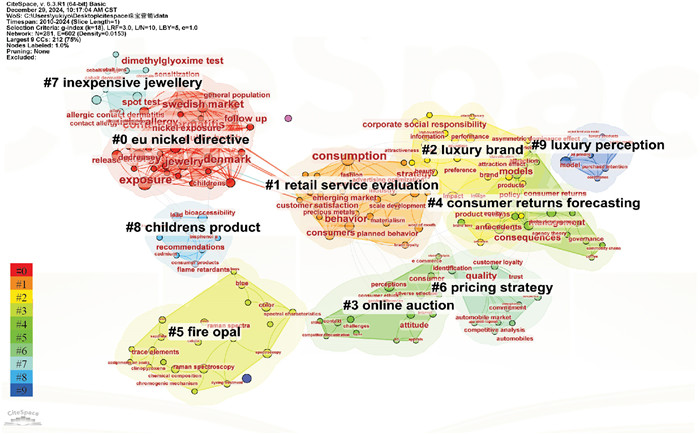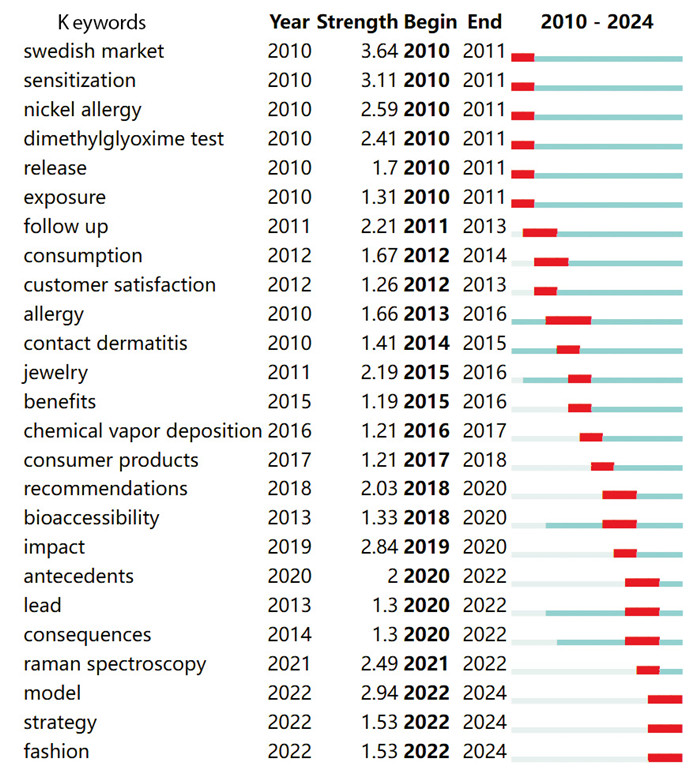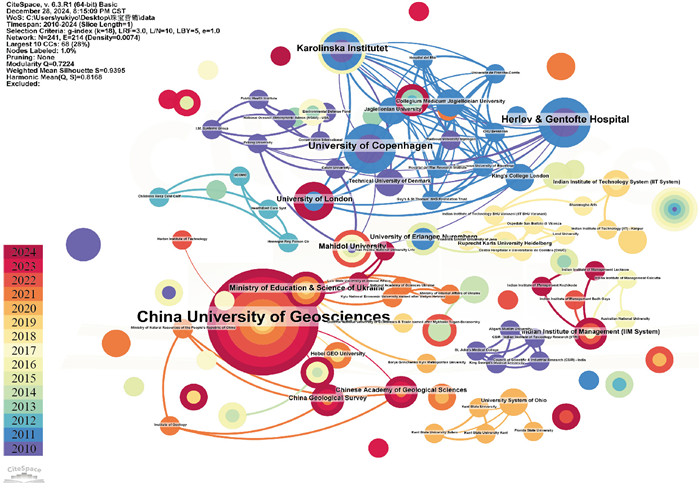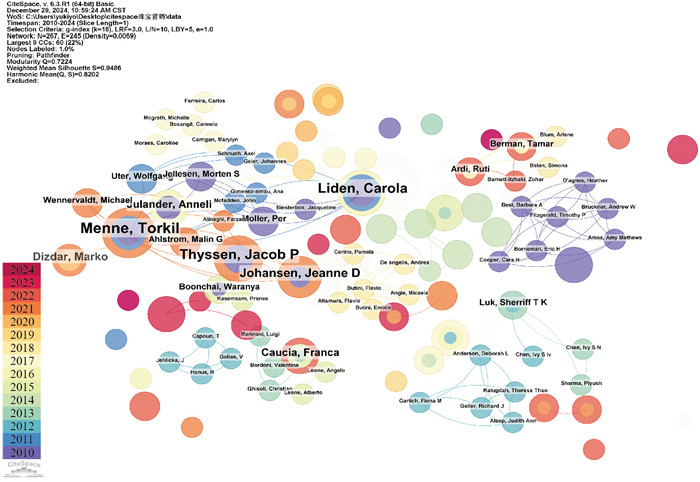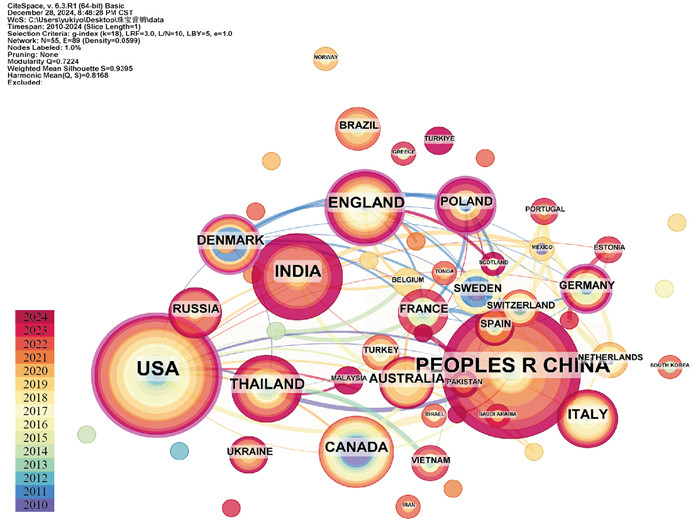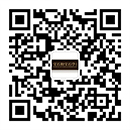Research Hotspots and Evolution in the Field of Jewelry Marketing: A Bibliometric and Knowledge Mapping Analysis
-
摘要:
本文选取Web of Science核心数据库中2010-2024年间收录的644篇相关文献,应用CiteSpace文献计量工具,探讨珠宝营销领域的研究热点和演进路径。从多个维度进行可视化分析,如年发文量趋势,关键词共现,聚类特征、机构,作者和国家合作网络,共引文献等。研究发现:珠宝营销领域的研究热点主要经历了三个阶段:2010-2014年,研究集中于消费者健康权益保护与行业法规影响,探讨珠宝材料安全性及其对市场信任度与品牌声誉影响的关联性;2015-2019年,研究重点逐渐转向消费者行为与品牌价值分析,如名人效应或品牌价值对消费者购买意愿的影响;2020-2024年,数字营销与可持续发展成为研究主流,直播电商、电子口碑及绿色珠宝设计引发广泛关注。本文揭示了珠宝营销领域从健康安全到数字化转型的研究路径,表明数字化技术与可持续理念将在未来发展中占据核心地位,为国内学者探索新的研究视角和珠宝行业创新发展提供理论支持。
Abstract:To explore the research hotspots and evolution paths in the field of jewelry marketing, this study selected 644 related articles from the Web of Science Core Database published between 2010 and 2024. Using CiteSpace for bibliometric analysis, the study visualized data across dimensions such as annual publication trends keyword co-occurrence, clustering characteristics, institutional and national collaboration networks, author partnerships, and co-citation analysis. The findings revealed three main phases in the evolution of research hotspots in the jewelry marketing field: from 2010 to 2014, studies focused on consumer health rights protection and the impact of industry regulations, specifically exploring the correlation between jewelry material safety and its effects on market trust and brand reputation; from 2015 to 2019, research shifted to consumer behavior and brand value analysis, such as the impact of celebrity endorsements or brand value on consumers' purchase intentions; and from 2020 to 2024, digital marketing and sustainability became mainstream topics, with live e-commerce, electronic word-of-mouth (eWOM), and green jewelry design attracting extensive attention. This study highlights the research trajectory of the jewelry marketing field from health and safety to digita transformation, suggesting that digital technologies and sustainability will play a central role in future development. The findings provide theoretical support for domestic scholars exploring new research perspectives and for the innovative development of the jewelry industry.
-
Keywords:
- jewelry marketing /
- research hotspot /
- CiteSpace /
- bibliometrics /
- knowledge mapping
-
-
表 1 2010-2024年珠宝营销研究领域被引量前5名文献
Table 1 Top 5 cited literatures in the field of jewelry marketing research from 2010 to 2024
序号 文章标题 发表年度 被引频次/次 作者 1 Nickel allergy and allergic contact dermatitis: A clinical review of immunology, epidemiology, exposure, and treatment 2019 184 Ahlström M G, Thyssen J P, Wennervald M, Menne T, Johansen J D 2 The catch-22 of responsible luxury: Effects of luxury product characteristics on consumers’ perception of fit with corporate social responsibility 2014 148 Janssen C, Vanhamme J, Lindgreen A, Lefebvre C 3 Shopping behavior of Chinese tourists visiting the United States: Letting the shoppers do the talking 2012 62 Xu Y, Mc Gehee N G 4 A spot test for detection of cobalt release-early experience and findings 2010 24 Thyssen J P, Menné T, Johansen J D, Lidén C, Julander A, Moller P, Jellesen M S 5 Selling to conspicuous consumers: Pricing, production, and sourcing decisions 2012 168 Tereya${\rm{\tilde g}}$o${\rm{\tilde g}}$lu N, Veeraraghavan S -
[1] 包德清, 万绮娟. 我国珠宝产业市场结构优化策略研究[J]. 中南财经政法大学学报, 2012(4): 137-140. doi: 10.3969/j.issn.1003-5230.2012.04.022 Bao D Q, Wan Q J. Research on the optimization strategy of market structure in China's jewelry industry[J]. Journal of Zhongnan University of Economics and Law, 2012 (4): 137-140. (in Chinese) doi: 10.3969/j.issn.1003-5230.2012.04.022
[2] 宣晓晏. 表达与建构: 珠宝消费行为中的文化心理作用机制[J]. 艺术设计研究, 2022 (2): 5-9. Xuan X Y. Expression and construction: The cultural psychological mechanism in jewelry consumption behavior[J]. Art & Design Research, 2022 (2): 5-9. (in Chinese)
[3] 陈稼瑜. 行动者网络视角下珍珠市场电商营销模式探析——以华东国际珠宝城为例[J]. 管理案例研究与评论, 2021, 14 (1): 66-78. Chen J Y. Analysis of e-commerce marketing models in the pearl market from the perspective of actor-network theory: A case study of East China International Jewelry City[J]. Journal of Management Case Studies, 2021, 14(1): 66-78. (in Chinese)
[4] 周玉梅. 珠宝类产品网络营销策略探讨[J]. 中国商贸, 2011(33): 24-25. Zhou Y M. Discussion on online marketing strategies for jewelry products[J]. China Business & Trade, 2011(33): 24-25. (in Chinese)
[5] Soni S, Sharma B K, Mishra S, et al. Technology influence on purchase intention with respect to luxury fashion[J]. International Journal of Indian Culture and Business Management, 2024, 32(1): 98-113. doi: 10.1504/IJICBM.2024.139001
[6] Uluturk A S, Asan U. Examining the moderating role of reasons in masstige luxury buying behavior[J]. Behavioral Sciences, 2024, 14(1): 67. doi: 10.3390/bs14010067
[7] Liu Z, Zhang Y H, Liang J, et al. The difference evaluation of light environment atmosphere index and consumers' psychological perception in jewelry stores[J]. Spectroscopy and Spectral Analysis, 2022, 42(2): 660-664.
[8] Denoncourt J A. Supporting sustainable development goal 5 gender equality and entrepreneurship in the tanzanite mine-to-market[J]. Sustainability, 2022, 14(7): 4 192. doi: 10.3390/su14074192
[9] Monika, Kapoor D. A Study of consumer behavior towards luxury products using the theory of planned behavior in Indian perspective[J]. Pacific Business Review International, 2022, 15(3): 61-75.
[10] Beasley L B, Song S Z. Linear operators that preserve Boolean rank of Boolean matrices[J]. Czechoslovak Mathematical Journal, 2013, 63(2): 435-440. doi: 10.1007/s10587-013-0027-z
[11] 陈悦, 陈超美, 刘则渊, 等. CiteSpace知识图谱的方法论功能[J]. 科学学研究, 2015, 33(2): 242-253. Chen Y, Chen C M, Liu Z Y, et al. The methodology function of CiteSpace mapping knowledge domains[J]. Studies in Science of Science, 2015, 33(2): 242-253. (in Chinese)
[12] 冯小军, 吴春杰, 刘晓斐, 等. 国外应急管理研究热点与演进——基于2001—2023年Web of Science数据库知识图谱分析[J]. 中国安全生产科学技术, 2024, 20(6): 190-196. Feng X J, Wu C J, Liu X F, et al. Hotspots and evolution of foreign research on emergency management: Based on knowledge graph analysis of Web of Science database from 2001 to 2023[J]. Journal of Safety Science and Technology, 2024, 20(6): 190-196. (in Chinese)
[13] Cheong S H, Choi Y W, Choi H Y, et al. Nickel and cobalt release from jewellery and metal clothing items in Korea[J]. Contact Dermatitis, 2014, 70(1): 11-18.
[14] Pignotti C. The influence of the globalisation in the Mexican jewellery[C]//3rd International Congress of Visual Arts Research (ANIAV), Univ Politecnica Valencia, 2017: 566-572.
[15] Wu C, Cosguner K. Profiting from the decoy effect: A case study of an online diamond retailer[J]. Marketing Science, 2020, 39(5): 974-995.
[16] 李柳颍, 武佳藤. 新冠肺炎疫情对居民消费行为的影响及形成机制分析[J]. 消费经济, 2020, 36 (3): 19-26. Li LY, Wu J T. The influence and formation mechanism of COVID-19 epidemic on residents' consumption behavior[J]. Consumer Economics, 2020, 36 (3): 19-26. (in Chinese)
[17] Bocca B, Forte G, Senofonte O, et al. A pilot study on the content and the release of Ni and other allergenic metals from cheap earrings available on the Italian market[J]. Science of the Total Environment, 2007, 388(1-3): 24-34.
[18] Schnuch A, Wolter J, Geier J, et al. Nickel allergy is still frequent in young German females-probably because of insufficient protection from nickel‐releasing objects[J]. Contact Dermatitis, 2011, 64(3): 142-150.
[19] The Commission of European Communities. European Parliament and Council Directive 94/27/EC of 30 June 1994 amending for the 12th time Directive 76/769/EEC on the approximation of the laws, regulations and administrative provisions of the Member States relating to restrictions on the marketing and use of dangerous substances and preparations[J]. Official Journal of the European Communities, 1994(37): 1-2.
[20] Lerma B, Dal Palù D, Actis Grande M, et al. Could black be the new gold? Design-driven challenges in new sustainable luxury materials for jewelry[J]. Sustainability, 2017, 10(1): 2.
[21] Tereyağoğlu N, Veeraraghavan S. Selling to conspicuous consumers: Pricing, production, and sourcing decisions[J]. Management Science, 2012, 58(12): 2 168-2 189.
[22] Thammaraksa C, Wattanawan A, Prapaspongsa T. Corporate environmental assessment of a large jewelry company: From a life cycle assessment to green industry[J]. Journal of Cleaner Production, 2017(164): 485-494.
[23] Li H, Lin J. On the development of Chinese luxurious jewelry's industry[C]//4th International Conference on Applied Social Science (ICASS), 2014, 53(3): 88-93.
[24] Chang W Y, Taecharungroj V, Kapasuwan S. Sustainable luxury consumers' preferences and segments: Conjoint and cluster analyses[J]. Sustainability, 2022, 14(15): 9551.
[25] Zhang L X, Shah K A M. Can CSR influence Chinese consumers' intention to purchase jewelry ethically? The moderating effect of eWOM based on the SOR model[J]. Asian Journal of Business Ethics, 2024, 13(1): 271-290.
[26] Wolff F C. Does price dispersion increase with quality? Evidence from the online diamond market[J]. Applied Economics, 2015, 47(55): 5 996-6 009.
[27] Chuangemanee P, Punnakitikashem P. Exploring decision making in social networking for jewelry items[C].//2016 IEEE International Conference on Management of Innovation and Technology (ICMIT). IEEE, 2016: 182-187.
[28] Rippa, A. From guest traders to live streamers[J]. Social Analysis, 2022, 66(1): 44-63.
[29] Thyssen J P, Jellesen M S, Menné T, et al. Cobalt release from inexpensive jewellery: Has the use of cobalt replaced nickel following regulatory intervention?[J]. Contact Dermatitis, 2010, 63(2): 70-76.
[30] Hani S, Marwan A, Andre A. The effect of celebrity endorsement on consumer behavior: Case of the Lebanese jewelry industry[J]. Arab Economic and Business Journal, 2018, 13(2): 190-196.
[31] Machado L, Goswami S. Marketing sustainability within the jewelry industry[J]. Journal of Marketing Communications, 2024, 30(5): 619-634.
[32] 茅丹, 夏天, 徐荟雅, 等. 适老化智能可穿戴服装的可视化文献计量分析[J]. 现代纺织技术, 2025, 33(3): 92-101. Mao D, Xia T, Xu H Y, et al. Visual bibliometric analysis of smart wearable clothing for the elderly[J]. Advanced Textile Technology, 2025, 33(3): 92-101. (in Chinese)
[33] Wennervaldt M, Ahlström M G, Menné T, et al. Nickel release from metallic earrings: A survey of the Danish market and validation of the nickel spot test[J]. Contact Dermatitis, 2021, 85(2): 178-185.
[34] Luk S T K, Zhou Y. Managing coronavirus CSR programmes to provoke emotional responses and purchase intention in the post-COVID-19 period in China: The case of luxury fashion brands[J]. Asia Pacific Business Review, 2025, 31(2): 301-304.
[35] Ahlström M G, Thyssen J P, Wennervaldt M, et al. Nickel allergy and allergic contact dermatitis: A clinical review of immunology, epidemiology, exposure, and treatment[J]. Contact dermatitis, 2019, 81(4): 227-241.
[36] Janssen C, Vanhamme J, Lindgreen A, et al. The Catch-22 of responsible luxury: Effects of luxury product characteristics on consumers' perception of fit with corporate social responsibility[J]. Journal of Business Ethics, 2014(119): 45-57.
[37] Xu Y, McGehee N G. Shopping behavior of Chinese tourists visiting the United States: Letting the shoppers do the talking[J]. Tourism Management, 2012, 33(2): 427-430.



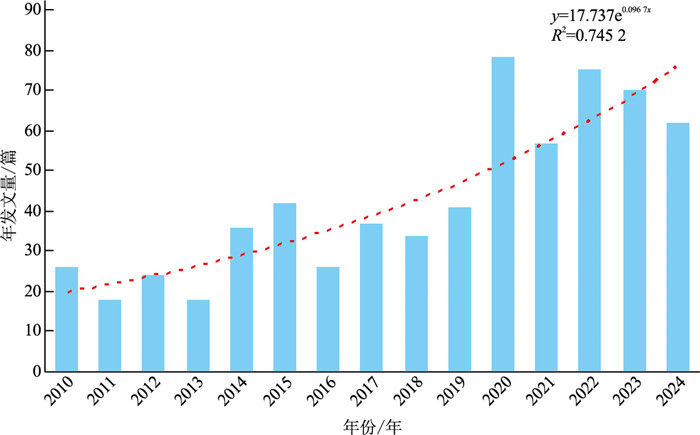
 下载:
下载:
